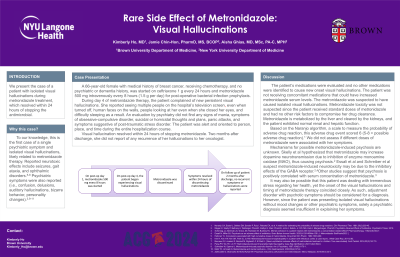Tuesday Poster Session
Category: Stomach
P5103 - Rare Side Effect of Metronidazole: Visual Hallucinations
Tuesday, October 29, 2024
10:30 AM - 4:00 PM ET
Location: Exhibit Hall E

Has Audio

Kimberly Ho, MD
Brown University / Rhode Island Hospital
Providence, RI
Presenting Author(s)
Kimberly Ho, MD1, Aisha Ghias, MD2, Jamie Chin-Hon, PharmD2
1Brown University / Rhode Island Hospital, Providence, RI; 2New York University Langone Health, Mineola, NY
Introduction: Metronidazole is commonly used after surgery for colorectal infection prophylaxis, intra-abdominal infections, and Helicobacter pylori infections. Psychiatric symptoms of metronidazole such as confusion, delusions, and personality changes have been reported but are rare. This is the first reported case of isolated visual hallucinations associated with metronidazole.
Case Description/Methods: A 66-year-old woman with breast cancer treated with cyclophosphamide and docetaxel four days prior to admission presented to the emergency room with acute right lower quadrant pain. She started ceftriaxone 1 g every 24 hours and metronidazole 500 mg intravenously every 8 hours for post-appendectomy prophylaxis. On post-op day 4, she reported persistent visual hallucinations. She saw multiple people on the hospital’s television screen even when turned off, human faces on the walls, people looking at her even when she closed her eyes, and difficulty sleeping as a result. The patient denied hearing voices and having hopelessness, lack of motivation, decreased energy, and difficulty concentrating. Psychiatric evaluation was unremarkable. The patient was alert and oriented to person, place, and time during the entire hospitalization. Metronidazole was stopped, and the visual hallucinations resolved within 24 hours. Two months after discharge, she denied recurrence of hallucinations.
Discussion: The patient received standard doses of metronidazole and did not have any medications that could have caused hallucinations or increased metronidazole serum levels. However, the metronidazole dose was not adjusted to assess the effect on her visual hallucinations. There was low incidence that visual hallucinations were related to her recent cycle of cyclophosphamide and docetaxel treatment. It is possible that this patient was dealing with tremendous stress regarding her health. As such, adjustment disorder with psychotic symptoms should be considered for a diagnosis. However, since the patient was presenting isolated visual hallucinations without mood changes or other psychiatric symptoms, solely a psychiatric diagnosis was insufficient to explain her symptoms.
The patient experienced persistent visual hallucinations beginning with her administration of metronidazole, which resolved quickly after discontinuing her metronidazole. Psychosis due to metronidazole should be considered in the differential diagnosis.
Disclosures:
Kimberly Ho, MD1, Aisha Ghias, MD2, Jamie Chin-Hon, PharmD2. P5103 - Rare Side Effect of Metronidazole: Visual Hallucinations, ACG 2024 Annual Scientific Meeting Abstracts. Philadelphia, PA: American College of Gastroenterology.
1Brown University / Rhode Island Hospital, Providence, RI; 2New York University Langone Health, Mineola, NY
Introduction: Metronidazole is commonly used after surgery for colorectal infection prophylaxis, intra-abdominal infections, and Helicobacter pylori infections. Psychiatric symptoms of metronidazole such as confusion, delusions, and personality changes have been reported but are rare. This is the first reported case of isolated visual hallucinations associated with metronidazole.
Case Description/Methods: A 66-year-old woman with breast cancer treated with cyclophosphamide and docetaxel four days prior to admission presented to the emergency room with acute right lower quadrant pain. She started ceftriaxone 1 g every 24 hours and metronidazole 500 mg intravenously every 8 hours for post-appendectomy prophylaxis. On post-op day 4, she reported persistent visual hallucinations. She saw multiple people on the hospital’s television screen even when turned off, human faces on the walls, people looking at her even when she closed her eyes, and difficulty sleeping as a result. The patient denied hearing voices and having hopelessness, lack of motivation, decreased energy, and difficulty concentrating. Psychiatric evaluation was unremarkable. The patient was alert and oriented to person, place, and time during the entire hospitalization. Metronidazole was stopped, and the visual hallucinations resolved within 24 hours. Two months after discharge, she denied recurrence of hallucinations.
Discussion: The patient received standard doses of metronidazole and did not have any medications that could have caused hallucinations or increased metronidazole serum levels. However, the metronidazole dose was not adjusted to assess the effect on her visual hallucinations. There was low incidence that visual hallucinations were related to her recent cycle of cyclophosphamide and docetaxel treatment. It is possible that this patient was dealing with tremendous stress regarding her health. As such, adjustment disorder with psychotic symptoms should be considered for a diagnosis. However, since the patient was presenting isolated visual hallucinations without mood changes or other psychiatric symptoms, solely a psychiatric diagnosis was insufficient to explain her symptoms.
The patient experienced persistent visual hallucinations beginning with her administration of metronidazole, which resolved quickly after discontinuing her metronidazole. Psychosis due to metronidazole should be considered in the differential diagnosis.
Disclosures:
Kimberly Ho indicated no relevant financial relationships.
Aisha Ghias indicated no relevant financial relationships.
Jamie Chin-Hon indicated no relevant financial relationships.
Kimberly Ho, MD1, Aisha Ghias, MD2, Jamie Chin-Hon, PharmD2. P5103 - Rare Side Effect of Metronidazole: Visual Hallucinations, ACG 2024 Annual Scientific Meeting Abstracts. Philadelphia, PA: American College of Gastroenterology.
